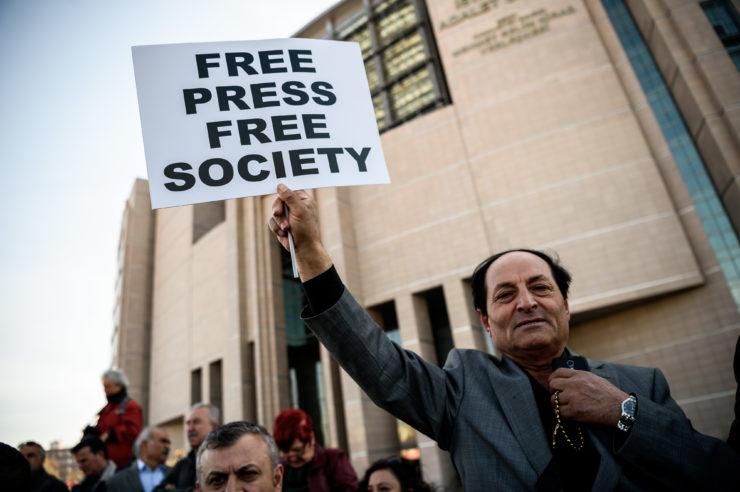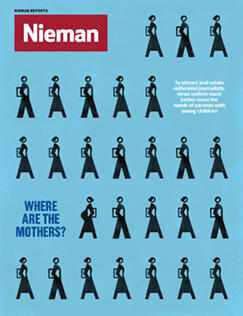
A demonstrator outside of the Istanbul courthouse in April 2016, when journalists from the newspaper Cumhuiyet faced charges of spying after publishing a report accusing Recep Tayyip Erdogan's government of seeking to illicitly deliver arms bound for neighboring Syria
On a sunny Friday in May, a sweetly solemn ceremony unfolded on the grounds of Harvard’s Lippmann House as Nieman Fellows gathered for a class reunion. Missing was Anja Niedringhaus, a treasured classmate and Associated Press photographer who was slain while covering elections in Afghanistan. In Anja’s honor, fellows from the class of 2007 dedicated a tree and stood beneath the young Eastern redbud, telling stories about their fallen friend.
I don’t know that I’ve heard a journalist described with more affection, both for her Pulitzer Prize-winning work and her distinct charm. A veteran of the Nieman staff who has known hundreds of fellows confided that afternoon that Anja had been her favorite. In 2014, an Afghan police officer opened fire on the photographer and AP colleague Kathy Gannon as they waited peacefully inside a car at a checkpoint near Khost. Gannon was badly injured. Niedringhaus died instantly. She was 48 .
The risks that journalists have taken in places like Afghanistan are extraordinary, and perhaps one reason why Niedringhaus also loved the leavening work of shooting the Olympics. But the once-clear boundaries we drew around assignments to mark them for danger are growing blurred.
On the eve of the Nieman Fellows’ memorial for Anya, Greg Gianforte, a Montana Republican, was voted into Congress in spite of—some say because of—his physical assault on Guardian journalist Ben Jacobs the night before. During the congressman-elect’s court hearing Jacobs said: “I asked Mr. Gianforte a question in the same manner I have asked questions of hundreds of politicians… [His] response was to slam me to the floor and start punching me.”
Gianforte pleaded guilty to misdemeanor assault but with a diluted description of his actions. “I grabbed his wrist,” he testified. “A scuffle ensued, and he was injured, as I understand it.” In describing the scene at his election-night party in Bozeman, Politico wrote that attendees “widely laughed off” the events. “When Gianforte apologized to the reporter he had assaulted, an attendee yelled that he was forgiven, as others shook their head, expressing the opinion that he shouldn’t have to apologize.”
Niedringhaus and Jacobs occupy distant poles on the continuum of violence against journalists. But the proximity of the memorial for her and the assault on him forced uncomfortable questions for me about how easily, dangerously, almost imperceptibly conditions can change for journalism in any part of the world.
President Trump’s insistent use of his candidacy and now office to demean and diminish journalism in the U.S. is redefining the historic relationship between the presidency and the press in perilous new ways. By some counts, the pugilistic video that portrayed him punching a figure representing CNN was his most widely shared tweet. More disquieting to me was the recent exchange between Trump and Russia’s Vladimir Putin. Gesturing to journalists covering their meeting, a giggling Putin asked, “These are the ones that insulted you?” And the new American president shared a mirthful moment with the veteran in whose country journalists have been murdered with impunity.
Last November, in a speech at the Committee to Protect Journalists’ 2016 International Press Freedom Awards, broadcaster Christiane Amanpour said, “Never in a million years did I expect to find myself appealing for the freedom and safety of American journalists at home.”
Trump’s tweets, she said, had “chilled” her.
“We are not there yet, but here’s a postcard from the world: This is how it goes with authoritarians around the world like Sisi, like Erdoğan, like Putin, like the Ayatollahs, like Duterte in the Philippines, and all of those people,” she said.
“International journalists know only too well: First the media is accused of inciting, then sympathizing, then associating—and then they suddenly find themselves accused of being full-fledged terrorists and subversives . They end up in handcuffs, in cages, in kangaroo courts, in prison—and then, who knows what?”
If any tree can claim patriotic roots, it is perhaps the Eastern redbud. It was a favorite of George Washington, who wrote about them in his diary and treasured the specimens at Mount Vernon. Thomas Jefferson wrote about them too and planted redbuds on the grounds of Monticello. Anya’s tree grows directly outside my office and through a tall mullioned window I’ve been keeping an eye on its sure summer progress. To gardeners, its flowering is a harbinger of spring, showy magenta blossoms signaling a new year. But I’ve been reading about redbuds and have learned not to count them out in the harsh months. One arborist wrote: “Even in winter, covered with snow, the Eastern redbud is stunning.”



